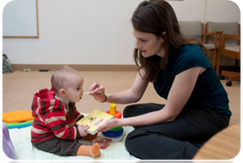The California Babies Project

Overview The California Babies Project is a study of Mexican origin children and their families. We are interested in better understanding the stresses and joys of family life. We hope to learn a little more about what Mexican origin families value, how they parent, and how their kids grow and thrive. We are also interested in learning more about what struggles these families have, and what makes these families resilient in the face of challenge. To accomplish this, we assess families when the child is 6 months, 18 months, 3 years old and 4 years old.
An important feature of this project, is the fact that through the California Families Project (PI Dr Rick Robins), investigators began studying some of the parents starting when they were in 5th grade! This means that we can examine how parents' early life experiences influence their parenting, and their child's development. For other projects stemming from the California Families Project, click here.
An important feature of this project, is the fact that through the California Families Project (PI Dr Rick Robins), investigators began studying some of the parents starting when they were in 5th grade! This means that we can examine how parents' early life experiences influence their parenting, and their child's development. For other projects stemming from the California Families Project, click here.

Why Mexican Origin Families? From 2000 to 2010, the Latino population grew roughly 43%, accounting for nearly half of the total growth of the U.S. population across that time, with the majority of U.S. Latinos (63%) being of Mexican origin. More Latinos live in California than any other state, and Mexican origin individuals make up 82% of the Latino population in California. In 2014, Latinos surpassed whites as the largest racial/ethnic group in California, making up over 50% of the population. Importantly, this population increase is due to babies born in the U.S., not immigration into the U.S. (which has largely remained stable). Despite the growing number of Mexican origin individuals (especially, Mexican origin children) and the relatively high proportion of individuals of Mexican origin relative to all other ethnic groups, this group is relatively neglected in terms of developmental research on young children. In fact, it is thought that we know less about Mexican origin children’s social and emotional development than other ethnic groups!
Our study approach Most studies of parenting and child development either bring families into a laboratory setting and observe interactions in structured tasks, or observe behaviors in the home for short periods of time. These approaches provide researchers with more global parenting styles, but don't capture the dynamic nature of parenting. Parenting by nature is highly dynamic and variable as parents must continually change their emotions and behaviors to meet the fluctuating needs of their children. But, like Gretchen Rubin says, in parenting "the days are long and the years are short." Parenting is emotionally intense because it is not limited to short 10 min laboratory sessions, and because the demands are changing on a moment to moment basis.
This is why we use a daily diary design where parents answer questions about their child's emotions and behaviors, as well as their own, for three times a day for six days. Using this design we can capture the good times, and the bad; the easy times, and the hard; the joyous times, and the frustrating ones. This allows us a more realistic understanding of life as it is lived.
This study is innovative in another way, as well. It is interdisciplinary. Self-regulation is both a psychological and biological process. Therefore, we collect biological data (stress hormones and sleep) in addition to emotions and behaviors to provide a more complete picture of parents and children's emotions, behaviors, and biology.
This is why we use a daily diary design where parents answer questions about their child's emotions and behaviors, as well as their own, for three times a day for six days. Using this design we can capture the good times, and the bad; the easy times, and the hard; the joyous times, and the frustrating ones. This allows us a more realistic understanding of life as it is lived.
This study is innovative in another way, as well. It is interdisciplinary. Self-regulation is both a psychological and biological process. Therefore, we collect biological data (stress hormones and sleep) in addition to emotions and behaviors to provide a more complete picture of parents and children's emotions, behaviors, and biology.

- Stress hormones Stress evokes feelings of irritability, tension, distress, or frustration. It can disrupt sleep and causes the release of the stress hormone, cortisol. Dr Hibel’s work has shown that stressors such as poverty and marital conflict may affect parent and child outcomes through their effects on stress hormones such as cortisol. This means that cortisol assessments provide an objective view into a parent’s brain, and a gauge of parent’s ability to cope with the demands of parenthood, and may be an early indicator of the effects of stress on young children. Throughout the day, parents collect saliva on themselves and their children, which we can assess for cortisol.

- Sleep Everybody sleeps, but many of us do not get enough of it. The National Sleep Foundation states that 6 month old infants should be sleeping roughly 12 to 15 hours, toddlers 11 to 14 hours, and preschoolers 10 to 13 hours across the day and night. Children growing up in high stress homes are particularly vulnerable to getting insufficient sleep. Children who do not get enough sleep become more vulnerable to emotional problems and cognitive delays. Likewise, low income parents who are often working multiple jobs, and non-standard shifts, are also often sleep deprived which can compromise their mental and physical health.We therefore measure the sleep of all family members.
